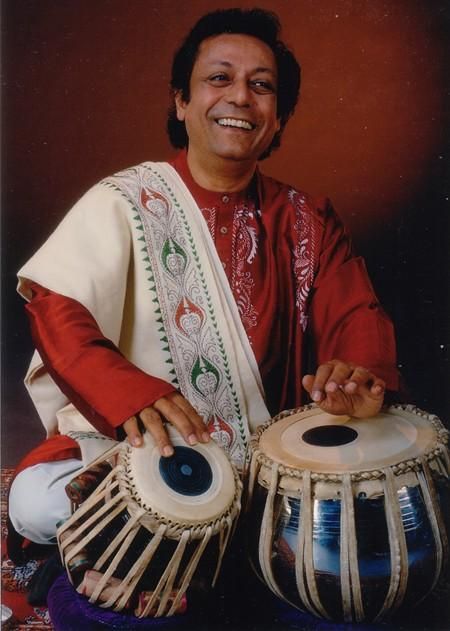Whole Lotta Tabla

Swapan Chaudhuri
John Bonham, John Paul Jones, Jimmy Page and Robert Plant have nothing on Swapan Chaudhuri. He was a match last Sunday evening for the excitement and meticulously sculpted volume they collectively produced in the band named Led Zeppelin that existed between the years 1968 and 1980. The difference is that Chaudhuri was performing at his customary superlative level before then, and continues true to form now with a future equally bright. This was a tabla lesson with a master for me, passing up a front row seat to sit in the back row where I could play along, my thighs or my ribs serving for tabla, doing my best to emulate what Swapanji was playing both technically and expressively. Led Zeppelin produced mighty actualizations of Shringara Rasa and Veera Rasa, but its fair to say that Swapanji began where they left off, taking us, the audience, into regions of human imagination that plummet deeper than the deepest ocean and higher than birds may fly. The awesome complexity of his rhythmic invention seems like having a painting of the inner workings of Bobby Fischer’s mind, all the labyrinthine subtleties dancing ecstatically while commandeered by this magic general of aural armies animated towards infinity; the delicacy of his timbral colors and touch like the alluringly subtle scent of rare orchids; caressing summer breezes under a full moon. Chaudhuri was ably paired with harmonium artist, Sanatan Goswami, who kept pace lock, stock and barrel, weaving elegantly sinuous tapestries of lehra. No wonder he is a favorite accompanist for many leading artists. Speaking with him after the performance, I learned Sanatanji also performs on Western keyboards as a solo artist, so that will be exciting to hear, too. Prior to Swapanji’s elocutions, I had the rare pleasure of hearing Sadanand Naimpalli perform on tabla. His guru, Taranath Rao, was the older brother of my teacher, Harihar Rao, and through the thrilling brilliance of his playing it felt like I had actually met Taranathji, who left us before my studies with Hariji began. Sadanandji’s development, flow, and articulation were nothing short of miraculous, and his performance left one pining for evenings and evenings devoted to his playing alone. Pankaj Mishra accompanied Sadanandji on the glorious sarangi, the instrument that introduced me to Indian classical music while an undergraduate in the form of an inspiring recording by Ram Narayan. Pankajgi’s playing of lehra was simply divine, and one was left wishing for solo performances featuring him, too. This all took place as part of a weekend Festival of Tabla presented by the Ravi and Shashi Bellare Arts Foundation at the splendid Chinmaya Mission of Los Angeles in Tustin. Myself, I wasn’t there for the Saturday performances, and most of the Sunday performances. I did fortuitously get to hear parts of performances by tabla artist, Jas Ahluwalia; vocalist Sohani Pawan; and sitarist Rajib Kamarkar. All three of them performed with hypnotic allure leaving one with the desire to hear more of their unique musical gifts. Rupesh Kotecha produced this extraordinary festival to perfection together with his wife, Mona, and sons, Saish and Satyam, all giving Southern California a priceless gift. I obviously got with the spirit of things even though I probably would have preferred the overall volume be reduced between thirty-three and fifty percent. For any patrons reading this, how about arranging some house concerts, perhaps even without any amplification? If so, please let me know about it! My apologies to all the artists I missed, and please check the Festival of Tabla site to learn who they are. - Michael Robinson, July 2018, Los Angeles
© 2018 Michael Robinson All rights reserved
Michael Robinson is a Los Angeles-based composer and writer (musicologist). |